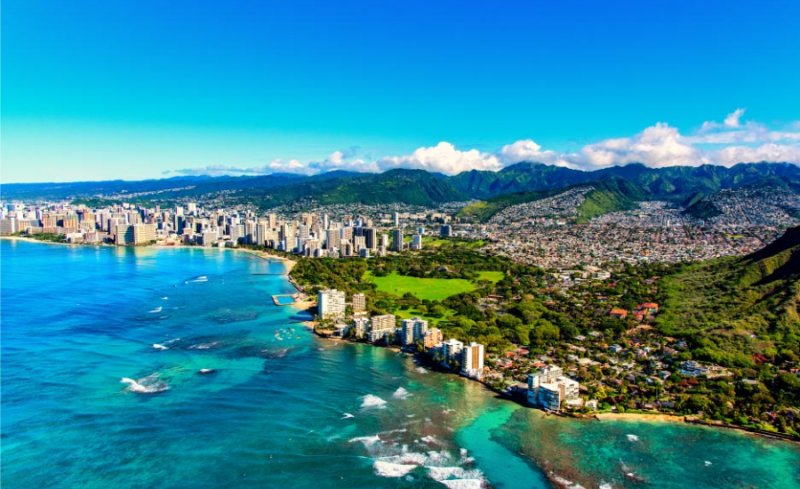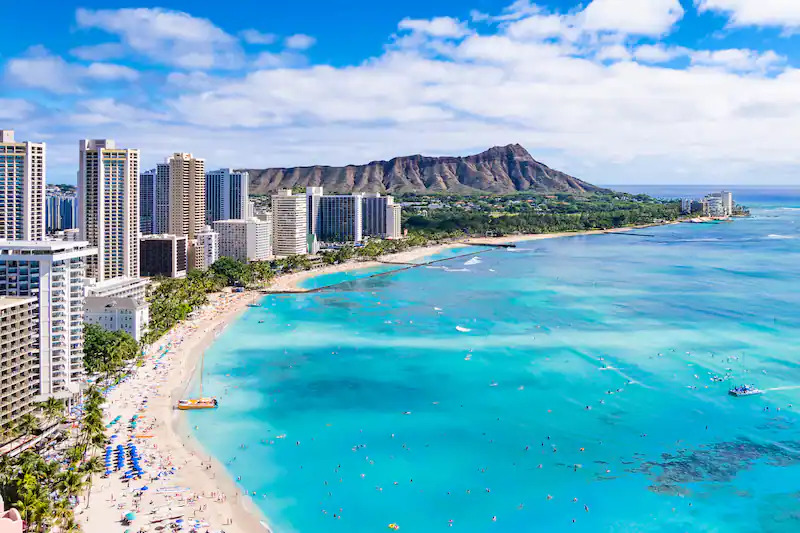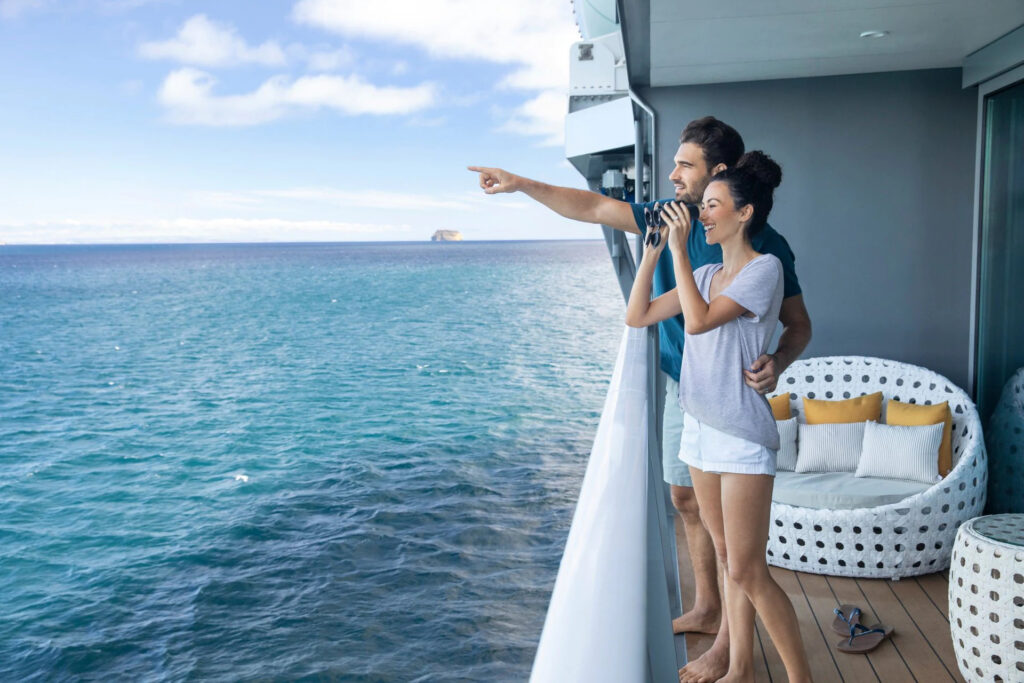
Hawaii is a tropical paradise. If so, you may be asking if a passport is required to travel there. U.S. citizens don’t need passports for domestic flights to Hawaii. Hawaii is one of the 50 states in the US and can be reached with a driver’s license or military ID. However, having a passport is a good idea in case of emergencies or if you plan to travel from Hawaii to another country. So pack your swimsuit and get ready to discover Hawaii’s magnificent scenery, rich culture, and friendly friendliness without a passport.
Why Hawaii is a dream travel destination

Adventurers, sunbathers, and nature lovers love Hawaii for good reason. This stunning Pacific Ocean archipelago is a paradise.
Hawaii has lush jungles, gushing waterfalls, spectacular volcanic scenery, and gorgeous beaches with blue oceans. Its natural beauty is breathtaking. Hawaii provides several ways to enjoy nature, whether you’re snorkeling or diving, hiking through national parks, or lounging on a beach.
Hawaii has rich culture and history. The islands provide a mix of cultures, from the indigenous Hawaiian culture with its intriguing traditions, hula dancing, and old customs to the different immigrant communities. To enjoy the islands’ vibrant legacy, visit historic landmarks, sacred temples, traditional cuisine, and local festivities.
Hawaii offers adventurers several outdoor activities. Surfing the famed North Shore waves, hiking to beautiful panoramas, zip-lining through leafy canopies, or perhaps enjoying a helicopter trip over the mesmerizing surroundings are just a few of the thrills that await.
Hawaii offers tranquility and relaxation with its year-round mild temperature and genuine hospitality. Hawaii’s laid-back atmosphere encourages visitors to relax, refresh, and embrace the “Aloha Spirit” that permeates everything.
Hawaii is a dream vacation spot that will capture your heart and leave you with amazing memories.
Understanding Hawaii’s Unique Status

Hawaii’s uniqueness comes from its US ties. Hawaii is a US state despite its location in the Pacific Ocean. Hawaii became the 50th state in 1959.
Hawaii is an archipelago, unlike the mainland states. Oahu, Maui, Hawaii (the Big Island), Kauai, Molokai, and Lanai are the largest and most famous islands. Hawaii’s appeal lies in the beauty and attractions of each island.
Hawaii’s inherent Hawaiian culture survives statehood. Hawaiian traditions, language, music, and art are still part of the islands’ culture. Hawaii’s colorful culture and old practices and beliefs can be explored by visitors.
Hawaii’s strategic Pacific Ocean position has made it a US military and commercial hub. Military outposts and defense installations demonstrate Hawaii’s strategic importance.
Hawaii’s unique status as a U.S. state with a rich indigenous culture and strategic importance in the Pacific Ocean makes it a fascinating destination that blends American and Hawaiian influences.
Domestic Travel Requirements
Passport requirements for domestic flights to Hawaii
Domestic and foreign travel to Hawaii must be distinguished. Domestic travel includes flights between US states, whereas international travel is between nations.
Domestic Hawaii travel is more easygoing than international travel. U.S. citizens can visit Hawaii with a government-issued ID. Domestic Hawaii flights do not require a passport.
Hawaii domestic flights require passports.
For domestic flights to Hawaii, a passport is recommended but not required. Passports can help in emergencies and travel modifications. Re-entering the US from Hawaii requires a passport.
If you don’t have a passport, you can travel to Hawaii with a state-issued driver’s license, a U.S. military ID, or a Trusted Traveller Programme card like Global Entry.
Domestic flights to Hawaii don’t require a passport, but airlines may have their own ID restrictions. Before traveling, check with your airline to make sure you have proper identification.
Hawaii and the Real ID Act

Hawaii, like other US states, follows the REAL ID Act. In 2005, Congress passed the REAL ID Act to strengthen state-issued IDs and driver’s licenses.
State-issued IDs and driver’s licenses must meet security criteria under the REAL ID Act to be valid for federal purposes, including boarding domestic flights or visiting federal buildings. These security measures protect identity verification processes and prevent identity fraud. For more information on how to ensure your ID meets these standards, you can visit www.campstar.com.
Hawaii offers REAL ID-compliant driver’s licenses and ID cards. The Act’s security standards are met by these star-marked cards. The REAL ID Act establishes federal criteria, but states must implement and issue REAL ID-compliant cards.
Any state’s REAL ID-compliant driver’s license or identification card can be used for domestic flights to Hawaii. If your ID isn’t REAL ID-compliant, you’ll need a passport or other TSA-approved ID.
Traveling to Hawaii or any other US state requires understanding the REAL ID Act. For the latest REAL ID compliance and approved identity document information, contact your state’s Department of Motor Vehicles or TSA.
Traveling from the United States Mainland
Hawaii from the U.S.
Tropical vacationers often fly from the mainland to Hawaii. Hawaii, a U.S. state, is thousands of miles from the mainland. Thus, this journey requires specific considerations and criteria.
U.S. citizen ID possibilities
U.S. citizens visiting Hawaii from the mainland have many identification alternatives. For domestic travel to Hawaii, a passport is suggested but not required. A valid passport can be used to re-enter the US in case of an emergency or to continue your trip from Hawaii to another country.
U.S. citizens can also fly domestically to Hawaii with a state-issued driver’s license or ID. Your driver’s license or ID card must comply with the REAL ID Act to board an aircraft.
U.S. citizens may also consider a Trusted Traveler Program card like Global Entry. These cards speed up airport screening and can be used as ID for flying domestically, including to Hawaii.
For the latest information on acceptable identity documents and Hawaii travel regulations, check with your airline and the Transportation Security Administration (TSA).
Traveling from U.S. Territories to Hawaii
U.S. territories like Guam, Puerto Rico, and the Virgin Islands have special status. Traveling from these territories to Hawaii requires special considerations.
Passport Needs: U.S. territories’ people don’t require passports to travel within the US, even to Hawaii. Domestic flights to Hawaii typically require a driver’s license or ID card.
REAL ID: The REAL ID Act extends to U.S. territories as well as the mainland. Flights may not accept non-REAL ID-compliant identity cards from your territory.
Traveling from Freely Associated States to Hawaii

Palau, Marshall Islands, and Micronesia are FAS. Traveling from these FAS nations to Hawaii requires special precautions due to their immigration and travel relationships with the US.
The Compact of Free Association gives FAS people preferential relations with the US. These countries can enter the US, including Hawaii, visa-free. However, a passport and proof of job or qualifications may be needed.
Transportation: Few FAS countries fly directly to Hawaii. Hawaii may require connecting flights from major U.S. cities or neighboring nations. Plan ahead and check for visa or transit requirements for connecting flights.
When traveling from U.S. territories or Freely Associated States to Hawaii, check with immigration authorities, airlines, and travel agencies for the latest information on documentation, visa requirements, and special considerations.
International Travelers to Hawaii

Passport requirements for international travelers
Hawaii requires passports for foreign visitors. Foreign travelers, including Americans, need a passport. Your passport must be valid for six months after your Hawaii departure date. This rule ensures that visitors have proper IDs.
Country-specific visa requirements
Hawaii visa requirements differ per country. Many nations have visa waiver arrangements with the US, allowing their people to visit for up to 90 days for tourist or business. Visa Waiver Programme (VWP).
However, not all countries are VWP members. Hawaii requires nonimmigrant visas for non-VWP citizens. Visa applications normally require supporting documentation, an interview at a U.S. embassy or consulate, and payment.
To determine your nationality’s visa requirements, visit the U.S. Department of State’s website or contact the nearest U.S. embassy or consulate. Start your visa application early to avoid delays.
International travelers to Hawaii must know the passport and visa requirements for a pleasant journey. To avoid travel issues, get a passport and visa in advance.
Visa Waiver Program and ESTA

The Visa Waiver Program (VWP) and Electronic System for Travel Authorization (ESTA) are crucial parts of the US immigration system for qualifying visitors.
Participants in the Visa Waiver Program can visit the US for tourism or business without a visa. ESTA permission is required before travel. ESTA collects biographical and eligibility information from travelers and checks it against security databases to assess VWP eligibility.
ESTA approval is usually instant, however, it’s best to apply 72 hours before departure. The authorization lasts two years or until the traveler’s passport expires.
The VWP permits visa-free access but does not ensure US entrance. U.S. Customs and Border Protection officials decide admissibility upon arrival.
The VWP requires a valid electronic passport, a return or onward ticket, and a 90-day stay. Unauthorized employment or overstaying might lead to VWP bans or immigration issues.
Non-VWP passengers who want to remain longer than 90 days must apply for a nonimmigrant visa. Consult the nearest U.S. embassy or consulate for visa category and application advice.
Traveling to Hawaii from non-U.S. countries

Foreign travelers to Hawaii must consider travel paperwork and requirements. To enjoy your trip to Hawaii, you should know the rules.
Necessary travel documents and requirements
Passport: Foreigners entering Hawaii must have a passport. Make sure your passport is valid for six months after you leave Hawaii. To avoid problems, check your home country and US passport validity criteria.
Visa: Hawaii may require a visa depending on your nationality and the reason of visit. Your visa depends on your stay, purpose, and bilateral agreements with the US. Consult the nearest U.S. embassy or consulate in your country for visa requirements and application procedures.
ESTA: Citizens of Visa Waiver Program (VWP) nations must use the ESTA. Online ESTA approval is required for Hawaii travel. Providing personal and travel information costs money. Before flying to the US, travelers must get ESTA approval, which lasts two years or until their passport expires.
Know the Hawaii travel regulations before you go. Start visa and ESTA applications early to avoid delays. Make sure you have a travel itinerary, accommodations, and enough money to stay.
Cruises to Hawaii

Hawaii cruises are a magical way to see the islands of the Aloha State. These cruises take visitors to several Hawaiian islands, each with its own beauty and culture. Hawaiian cruises provide stunning views of Maui, Kauai, and Honolulu.
In ports like Hilo, Kona, and Nawiliwili, cruisers may experience the local culture, eat wonderful food, and enjoy fun activities like snorkeling, hiking, and visiting historical sites. Onboard amenities and entertainment make island hopping comfortable and fun.
Planning a Hawaii cruise requires consideration of cruise duration, departure ports, and itinerary islands and attractions. Finding the right cruise line for your preferences and budget requires research. Hawaii cruises provide tropical beauty, genuine hospitality, and amazing memories.
Traveling to Hawaii with Children

Minor passports
Minors need passports to visit Hawaii. For overseas travel, all children need passports. To allow for processing, apply for passports early. Parents or legal guardians must consent to the child’s passport application and may need to appear with the child. Check your country’s minor passport requirements.
Permissions and paperwork
To comply with child custody rules and avoid travel complications, additional consent and documents may be needed while traveling to Hawaii with children, especially if one parent is absent. Carry a notarized consent letter from the absent parent or legal guardian allowing the youngster to travel with the accompanying adult(s). This letter should include contact information and pertinent details about the missing parent or guardian. To establish parent-child or legal guardianship, bring copies of legal documents such as birth certificates or adoption papers. Immigration and customs may seek these documents. When flying to Hawaii with children, check with your home country and US immigration officials for consent needs and other papers.
Travel Requirements for U.S. green card holders

Hawaii has travel requirements for green card holders. To guarantee a pleasant trip, green card holders must grasp travel laws.
- Valid Green Card:
Traveling to Hawaii as a green card holder requires a valid Permanent Resident Card (Form I-551). Keep your green card valid throughout your journey.
- Advance Parole:
Before visiting Hawaii, you may need Advance Parole paperwork if you have a pending adjustment of status application or are a conditional permanent resident. This document lets you return to the US without losing your application or status. You must speak with USCIS to decide if you need Advance Parole and apply for it in advance.
Necessary documentation for permanent residents
As a U.S. permanent resident coming to Hawaii, you must have identification and proof of residency.
- Valid Passport:
As a green card holder traveling to Hawaii, a passport is encouraged but not essential. During security inspections, a valid passport can prove your identity.
- Green Card:
The most vital document to bring to Hawaii is your green card. It proves your US permanent residency. Keep your green card handy for check-in, immigration checks, and security screenings.
- Supporting Documents:
To prove your US citizenship and identity, carry a driver’s license or state ID card. These documents can help with travel questions.
As a U.S. permanent resident, you can have hassle-free travel to Hawaii by having a valid green card, contemplating Advance Parole, and carrying the proper papers.
Traveling to Hawaii via Private Aircraft

Passport requirements for private aircraft travelers
Passport requirements for private aircraft passengers traveling to Hawaii are crucial. Private aircraft travelers must have a passport to enter the US, including Hawaii, just like commercial air travelers. Make sure all passengers have valid passports for at least six months after departure.
Additional considerations for private aircraft travel
Private aircraft travel to Hawaii requires more than just a passport. Important considerations:
CBP Procedures: Hawaii’s CBP requires private aircraft arrivals. This requires reporting to a port of entry, submitting paperwork, and facing customs and immigration checks. To enter the nation smoothly, you must know CBP protocols.
Flight Permits: Hawaii requires flight planning and permits for private aircraft. Flight permissions and air traffic control restrictions are required. To comply with all regulations, choose a respected flight planning provider or speak with aviation authorities.
Safety Measures: Private aircraft passengers must follow commercial flight security. Passenger and luggage screening, security checks, and aviation security compliance are examples. To travel safely, be aware of and follow security procedures.
By understanding the passport requirements for private aircraft tourists and other variables, you may plan and enjoy your vacation to Hawaii successfully and in conformity with all regulations.
Passport requirements for traveling to Hawaii by sea

For a successful maritime trip to Hawaii, know the passport requirements. Key considerations:
Passport for International Travel:
Passports are required for marine travel to Hawaii from other countries. Make sure your passport is valid for six months after you leave. Check your home country’s and the US’s admission criteria for passport needs.
The Passport for Domestic Travel:
Passports are not necessary for marine travel to Hawaii from other U.S. states. However, a driver’s license or state identification card is advised for cruise ship boarding and security checks.
Documents needed for sea travel
When sailing to Hawaii, other required documents include passports:
Proof of Citizenship: Travelers should carry a birth certificate or naturalization certificate with their passports. Immigration and US entrance may require certain documents.
Cruise lines may need pre-registration documents, medical questionnaires, or releases. Before departing, cruise line paperwork must be reviewed and completed. This streamlines check-in and assures policy compliance.
By understanding the passport requirements for sea travel to Hawaii and preparing the relevant documentation, you can have a relaxing sea cruise to the lovely islands of Hawaii.
Considerations for travelers with a criminal record

With a criminal background, traveling to Hawaii needs cautious planning. Consider these factors:
Entry Eligibility:
Traveling to Hawaii with a criminal past may impair your eligibility. Your admissibility may depend on the crime and legal proceedings. Understand the US admission requirements and speak with legal specialists or immigration officials to determine your eligibility.
Travel Documentation:
Traveling to Hawaii with a criminal record requires proper documents. This includes a valid passport and all necessary visas or permits. Make sure your travel documents meet US and home country standards.
Potential restrictions and necessary procedures
Criminal records may limit travel to Hawaii:
Background Checks include:
Immigration authorities may conduct background checks based on the offense and your travel purpose. Visa applications, port of entry, and immigration inspections may include these checks. Avoid legal issues by being honest about your criminal history.
Waivers and Rehabilitation:
Waivers or rehabilitation programs may help criminals travel. The criminal and immigration policies determine these programs and processes. To examine waiver or rehabilitation alternatives, consult a lawyer and relevant authorities.
Traveling to Hawaii with a criminal record requires careful investigation into legal issues and travel restrictions. Legal advice, immigration authorities, or the nearest U.S. embassy or consulate can assist you travel legally.
Travel Insurance and Other Considerations

Hawaii travel insurance is crucial. It covers cancellations, medical crises, lost luggage, and travel delays. Travel insurance can ease your mind and reduce financial dangers. Review the coverage options and policy details to ensure they match your needs and give enough protection. Traveling to Hawaii requires consideration of weather, local customs, transportation, and health and safety rules. Hawaii will be more pleasurable if you plan and know the destination. Before leaving, review your travel insurance needs and consider all the things that will make your Hawaii vacation unforgettable.
Conclusion
Hawaii travel needs careful consideration of domestic and international travel rules, documents, and specific circumstances like traveling with children or a criminal background. A seamless and enjoyable journey requires knowledge of your situation’s norms and restrictions. Passports, visas, and accompanying documentation are required for U.S. citizens, permanent residents, and overseas travelers. Knowing about the REAL ID Act or travel limitations from U.S. territory can help avoid last-minute shocks. Hawaii’s stunning scenery, rich culture, and friendly hospitality may be enjoyed by preparing ahead, staying informed, and asking for help. To comply with travel rules, verify official sources and consult authorities. Pack your luggage, prepare for adventure, and make memories in Hawaii’s tropical paradise.



